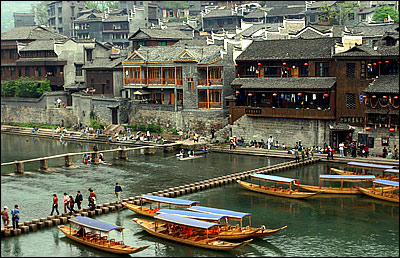 Folk Customs and Habits
Folk Customs and Habits
The diverse cultures and life styles of China's 56 ethnic groups are reflected in their festivals. The biggest Tibetan festival -- Shoton (Yogurt) Festival -- is also the setting for the annual Tibetan Theatrical Festival when, for five days in summer, Tibetan theatrical groups perform and compete in the Norbulingka, the summer palace of the Dalai Lamas.

Another summer festival is the Nadam Fair on the Mongolian grasslands where the attractions include wrestling, horse racing and archery contests.
March Street is celebrated on Diancang Mountain by the Bai people of Dali, Yunnan Province. It is associated with the Buddhist Goddess of Mercy suppressing a devil to help the Bai people and it became traditional to burn incense and offer sacrifices to commemorate her virtues. The festival has become a major annual gathering for Bai commercial, cultural and sports activities.
The Water-Sprinkling Festival of the Dai ethnic group in Xishuangbanna, Yunnan Province, is a lively springtime celebration. People chase and pour water (a symbol of good luck and happiness) over each other, among other activities such as dragon boat racing and peacock dances.
Lugu Lake, between Sichuan and Yunnan provinces, has become a tourist destination following the building of a new highway giving access to this area. The matriarchal society of the 30,000 local Mosuo people is noted for its "no marriage" traditions and is called the last women's kingdom on earth. The grace of the Mosuo women, the elegance of their canoes and the undulating singing constitute the "three uniquenesses on the lake."
